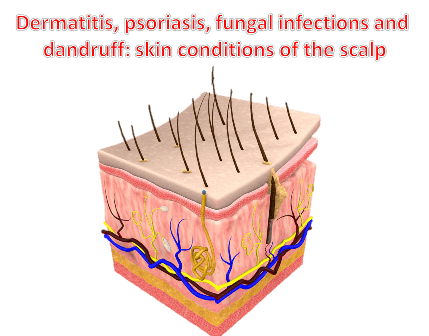Skin Conditions Of The Scalp
A scalp not healthy can bring about inflammation that makes it really difficult for hair to grow more.
Skin conditions that lead to baldness include dermatitis, psoriasis, fungal infections and dandruff.
Seborrheic dermatitis forces the scalp to shed its skin, so you’ll see greasy, yellowish scales on your clothes or in your hair locks.
Malassezia can be the cause of it, a fungus, hormonal changes, or too much sebum (oil) in your skin.
Psoriasis is an autoimmune disease that causes excessive skin cell change, brings about a whitish scale on the scalp.
Get your scalp examined (like for example get a biopsy of the scalp and a fungal culture) so you know what is the exact condition from which you are suffering.
Get a medicated shampoo for seborrheic dermatitis, if you have psoriasis, get a light therapy, and oral antifungals in case you are suffering from ringworm.
One thing is for sure: you have to know exactly what your scalp is suffering from, so you know exactly what exact treatment you can get.
Alopecia areata
Among the skin conditions of the scalp, there is an autoimmune disorder where the immune system attacks hair roots. affecting about almost 5 million people in the US and happens equally in men and women.
Stress or illness may be the cause, but the real source of it is still unknown.
It can occur in three ways:
- Alopecia areata commonly causes round, smooth patches of hair loss on the eyebrows, scalp, or arms and legs;
- Total baldness on the scalpis known as alopecia totalis, while
- Hair thinning happening all over the body is denominated alopecia Universalis.
Observing the pattern of baldness can usually determine what type of alopecia you are suffering from.
You should do blood tests to check your iron stores.
Get also a hormones check done, in order to rule out underlying conditions that may bring about hair thinning.
Alopecia areata is often be treated with corticosteroids (intralesional).
The use of our Full Program to stop hair loss, can definitely help you with this condition.
Excessive styling can bring about hair loss
If you shampoo way too much, and especially with the wrong shampoo for your hair type (I mean, one of those harsh products which contain SLS, parabens. Sulphates, DEA etc), and excessive styling and dyeing, can damage your hair.
You should know that heat and aggressive chemicals contained in these products can weaken your locks and roots, forcing it to break and fall out.
A big damage to your hair can also be done by a combination of all these “programs”, such as blow-drying, coloring and keratin treatments.
If the loss is happening from external damage caused by these factors that I have just described, the hair shaft will break, and you won’t see those telogen bulbs at the bottom.
You can also do the famous pull test, but of course you have to contact a dermatologist of a trichologist.

The practitioner will take about 50 strands, pulling them gently out, and checking to see if the hair that comes out has bulbs on the extremities.
Avoid using tools that overheat your scalp and locks
Reduce the use of flat irons, and your hair dryer should be set on cool and low settings.
Don’t color your hair more than one or two shades of its natural condition : the bigger the color change, the more chemicals you require, which can make break your shafts.
If you use lacquer or gel, don’t wait for it to dry before you comb through it, because it will get stiff and it will be easier for it to break.
The condition of your hair doesn’t just affect your looks—it’s an important indicator of your health.
Stop hair loss naturally
If you’re experiencing hair loss, talk to a trichlogist, check your scalp, change shampoo in favor of a natural product, and watch the intro videos of the Endhairloss program to stop hair fall naturally.
With the use of our program you can reestablish the micro blood flow to the scalp and deactivate the hormone DHT: once your hair is free from its 2 main enemies, it will be so much easier to stop your excessive shedding.
We also teach how to definitely cure the bad skin conditions of the scalp, and we have several videos where this subject is thoroughly discussed.
Check out the presentation videos of our program today!
